Cross Cultural Management Strategies: HydroGeneration in Uganda
VerifiedAdded on 2024/07/12
|9
|2181
|271
Report
AI Summary
This report examines the cross-cultural management challenges faced by HydroGeneration, a US-based organization, in its hydroelectric power plant project in Uganda. It delves into issues related to leadership, cultural disparities, and HRM policies. The report analyzes the effectiveness of different leadership styles, such as transformational and implicit leadership, in addressing the cultural nuances and potential conflicts. It also discusses the importance of understanding national culture, particularly in a region with prevalent superstitions and religious fervor. The report further evaluates the attitudes of key personnel, such as Charles Martin and James Green, and suggests the application of Hofstede's Six Dimensions of Culture Theory to navigate cultural differences. It highlights the need for effective cross-cultural communication, ethical HRM policies, and appropriate training to mitigate issues like high employee turnover and ensure the success of the project. The report concludes by recommending strategies to enhance the organization's functioning and address the diverse needs of its employees.

CROSS CULTURAL MANAGEMENT
1
1
Paraphrase This Document
Need a fresh take? Get an instant paraphrase of this document with our AI Paraphraser
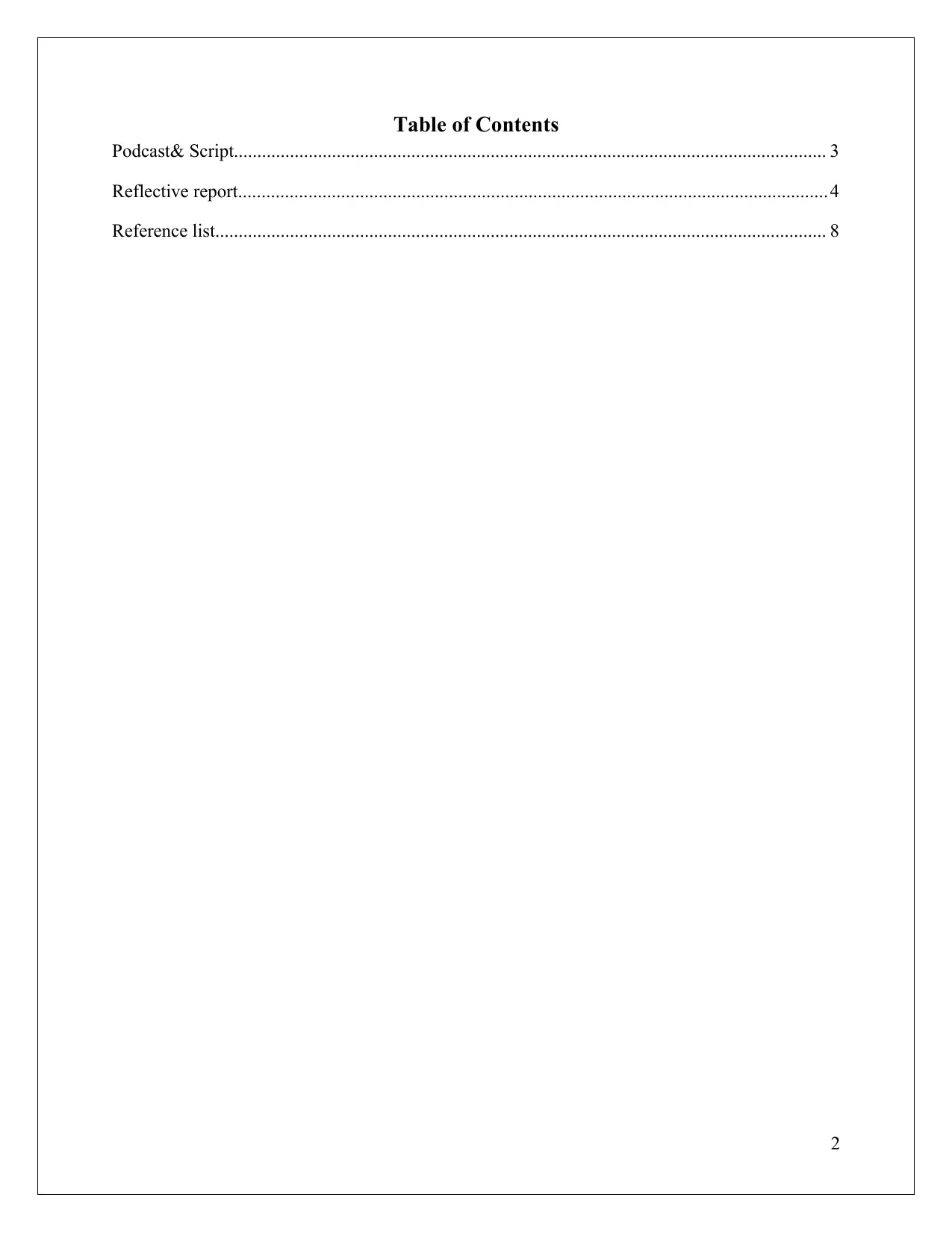
Table of Contents
Podcast& Script............................................................................................................................... 3
Reflective report..............................................................................................................................4
Reference list................................................................................................................................... 8
2
Podcast& Script............................................................................................................................... 3
Reflective report..............................................................................................................................4
Reference list................................................................................................................................... 8
2
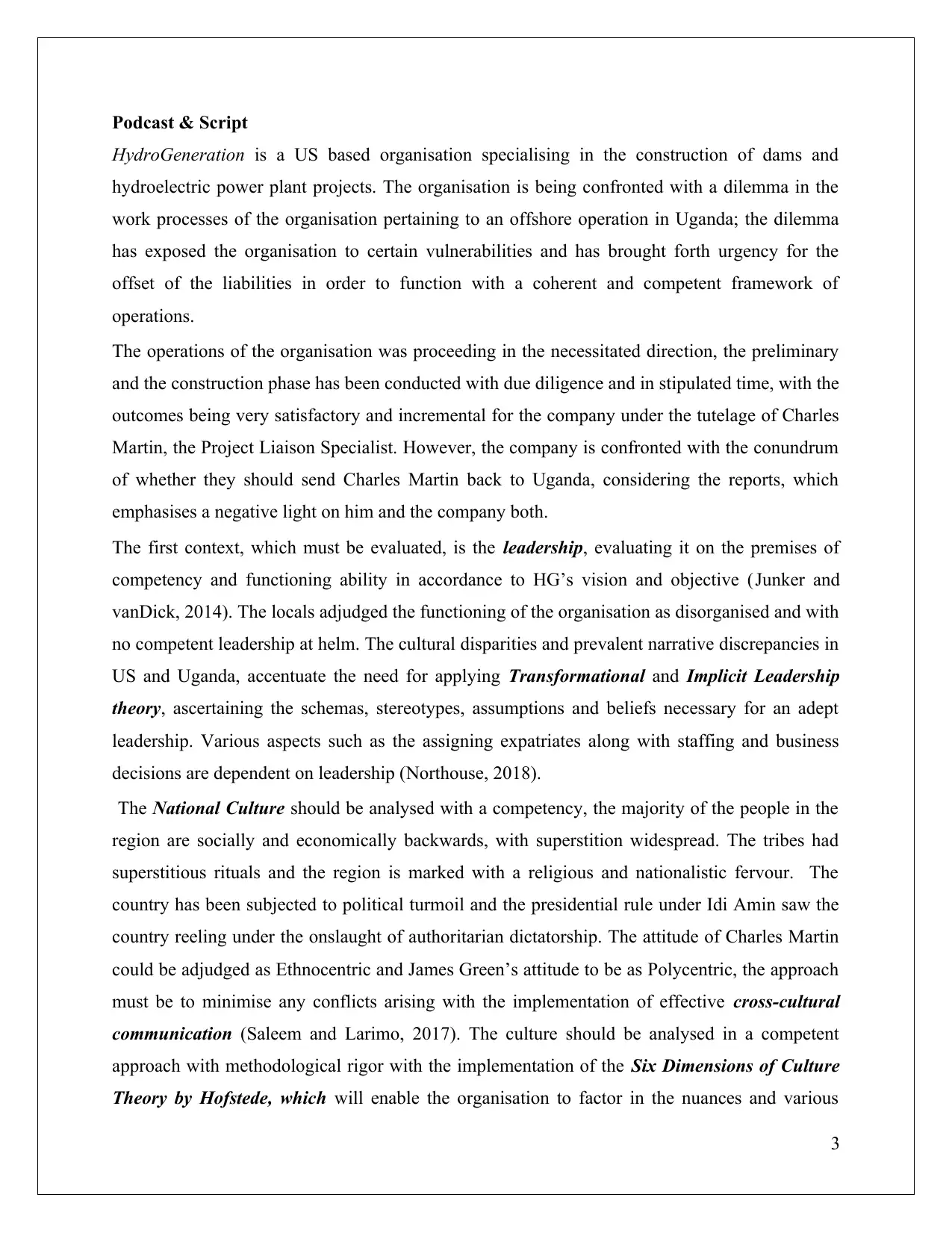
Podcast & Script
HydroGeneration is a US based organisation specialising in the construction of dams and
hydroelectric power plant projects. The organisation is being confronted with a dilemma in the
work processes of the organisation pertaining to an offshore operation in Uganda; the dilemma
has exposed the organisation to certain vulnerabilities and has brought forth urgency for the
offset of the liabilities in order to function with a coherent and competent framework of
operations.
The operations of the organisation was proceeding in the necessitated direction, the preliminary
and the construction phase has been conducted with due diligence and in stipulated time, with the
outcomes being very satisfactory and incremental for the company under the tutelage of Charles
Martin, the Project Liaison Specialist. However, the company is confronted with the conundrum
of whether they should send Charles Martin back to Uganda, considering the reports, which
emphasises a negative light on him and the company both.
The first context, which must be evaluated, is the leadership, evaluating it on the premises of
competency and functioning ability in accordance to HG’s vision and objective (Junker and
vanDick, 2014). The locals adjudged the functioning of the organisation as disorganised and with
no competent leadership at helm. The cultural disparities and prevalent narrative discrepancies in
US and Uganda, accentuate the need for applying Transformational and Implicit Leadership
theory, ascertaining the schemas, stereotypes, assumptions and beliefs necessary for an adept
leadership. Various aspects such as the assigning expatriates along with staffing and business
decisions are dependent on leadership (Northouse, 2018).
The National Culture should be analysed with a competency, the majority of the people in the
region are socially and economically backwards, with superstition widespread. The tribes had
superstitious rituals and the region is marked with a religious and nationalistic fervour. The
country has been subjected to political turmoil and the presidential rule under Idi Amin saw the
country reeling under the onslaught of authoritarian dictatorship. The attitude of Charles Martin
could be adjudged as Ethnocentric and James Green’s attitude to be as Polycentric, the approach
must be to minimise any conflicts arising with the implementation of effective cross-cultural
communication (Saleem and Larimo, 2017). The culture should be analysed in a competent
approach with methodological rigor with the implementation of the Six Dimensions of Culture
Theory by Hofstede, which will enable the organisation to factor in the nuances and various
3
HydroGeneration is a US based organisation specialising in the construction of dams and
hydroelectric power plant projects. The organisation is being confronted with a dilemma in the
work processes of the organisation pertaining to an offshore operation in Uganda; the dilemma
has exposed the organisation to certain vulnerabilities and has brought forth urgency for the
offset of the liabilities in order to function with a coherent and competent framework of
operations.
The operations of the organisation was proceeding in the necessitated direction, the preliminary
and the construction phase has been conducted with due diligence and in stipulated time, with the
outcomes being very satisfactory and incremental for the company under the tutelage of Charles
Martin, the Project Liaison Specialist. However, the company is confronted with the conundrum
of whether they should send Charles Martin back to Uganda, considering the reports, which
emphasises a negative light on him and the company both.
The first context, which must be evaluated, is the leadership, evaluating it on the premises of
competency and functioning ability in accordance to HG’s vision and objective (Junker and
vanDick, 2014). The locals adjudged the functioning of the organisation as disorganised and with
no competent leadership at helm. The cultural disparities and prevalent narrative discrepancies in
US and Uganda, accentuate the need for applying Transformational and Implicit Leadership
theory, ascertaining the schemas, stereotypes, assumptions and beliefs necessary for an adept
leadership. Various aspects such as the assigning expatriates along with staffing and business
decisions are dependent on leadership (Northouse, 2018).
The National Culture should be analysed with a competency, the majority of the people in the
region are socially and economically backwards, with superstition widespread. The tribes had
superstitious rituals and the region is marked with a religious and nationalistic fervour. The
country has been subjected to political turmoil and the presidential rule under Idi Amin saw the
country reeling under the onslaught of authoritarian dictatorship. The attitude of Charles Martin
could be adjudged as Ethnocentric and James Green’s attitude to be as Polycentric, the approach
must be to minimise any conflicts arising with the implementation of effective cross-cultural
communication (Saleem and Larimo, 2017). The culture should be analysed in a competent
approach with methodological rigor with the implementation of the Six Dimensions of Culture
Theory by Hofstede, which will enable the organisation to factor in the nuances and various
3
⊘ This is a preview!⊘
Do you want full access?
Subscribe today to unlock all pages.

Trusted by 1+ million students worldwide
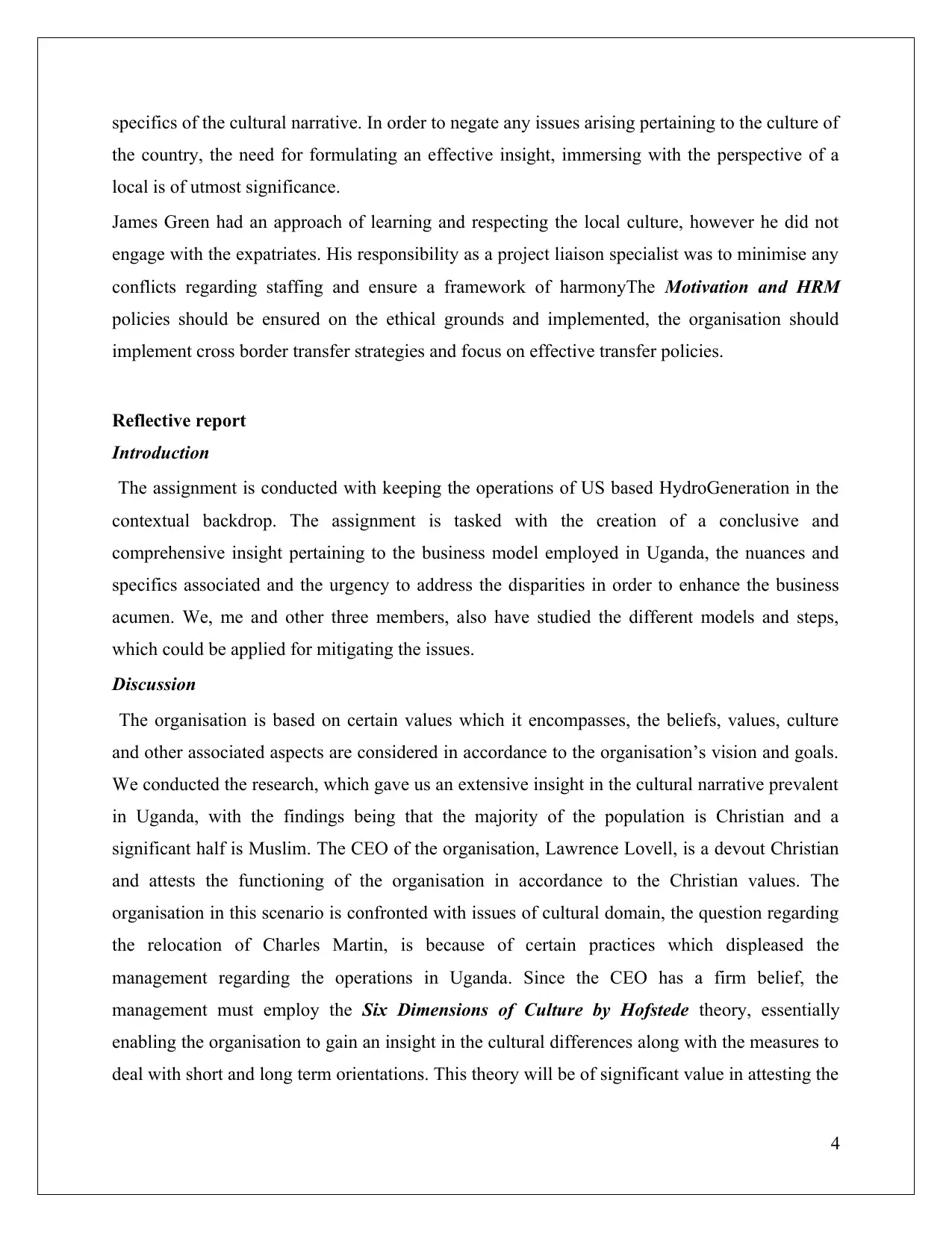
specifics of the cultural narrative. In order to negate any issues arising pertaining to the culture of
the country, the need for formulating an effective insight, immersing with the perspective of a
local is of utmost significance.
James Green had an approach of learning and respecting the local culture, however he did not
engage with the expatriates. His responsibility as a project liaison specialist was to minimise any
conflicts regarding staffing and ensure a framework of harmonyThe Motivation and HRM
policies should be ensured on the ethical grounds and implemented, the organisation should
implement cross border transfer strategies and focus on effective transfer policies.
Reflective report
Introduction
The assignment is conducted with keeping the operations of US based HydroGeneration in the
contextual backdrop. The assignment is tasked with the creation of a conclusive and
comprehensive insight pertaining to the business model employed in Uganda, the nuances and
specifics associated and the urgency to address the disparities in order to enhance the business
acumen. We, me and other three members, also have studied the different models and steps,
which could be applied for mitigating the issues.
Discussion
The organisation is based on certain values which it encompasses, the beliefs, values, culture
and other associated aspects are considered in accordance to the organisation’s vision and goals.
We conducted the research, which gave us an extensive insight in the cultural narrative prevalent
in Uganda, with the findings being that the majority of the population is Christian and a
significant half is Muslim. The CEO of the organisation, Lawrence Lovell, is a devout Christian
and attests the functioning of the organisation in accordance to the Christian values. The
organisation in this scenario is confronted with issues of cultural domain, the question regarding
the relocation of Charles Martin, is because of certain practices which displeased the
management regarding the operations in Uganda. Since the CEO has a firm belief, the
management must employ the Six Dimensions of Culture by Hofstede theory, essentially
enabling the organisation to gain an insight in the cultural differences along with the measures to
deal with short and long term orientations. This theory will be of significant value in attesting the
4
the country, the need for formulating an effective insight, immersing with the perspective of a
local is of utmost significance.
James Green had an approach of learning and respecting the local culture, however he did not
engage with the expatriates. His responsibility as a project liaison specialist was to minimise any
conflicts regarding staffing and ensure a framework of harmonyThe Motivation and HRM
policies should be ensured on the ethical grounds and implemented, the organisation should
implement cross border transfer strategies and focus on effective transfer policies.
Reflective report
Introduction
The assignment is conducted with keeping the operations of US based HydroGeneration in the
contextual backdrop. The assignment is tasked with the creation of a conclusive and
comprehensive insight pertaining to the business model employed in Uganda, the nuances and
specifics associated and the urgency to address the disparities in order to enhance the business
acumen. We, me and other three members, also have studied the different models and steps,
which could be applied for mitigating the issues.
Discussion
The organisation is based on certain values which it encompasses, the beliefs, values, culture
and other associated aspects are considered in accordance to the organisation’s vision and goals.
We conducted the research, which gave us an extensive insight in the cultural narrative prevalent
in Uganda, with the findings being that the majority of the population is Christian and a
significant half is Muslim. The CEO of the organisation, Lawrence Lovell, is a devout Christian
and attests the functioning of the organisation in accordance to the Christian values. The
organisation in this scenario is confronted with issues of cultural domain, the question regarding
the relocation of Charles Martin, is because of certain practices which displeased the
management regarding the operations in Uganda. Since the CEO has a firm belief, the
management must employ the Six Dimensions of Culture by Hofstede theory, essentially
enabling the organisation to gain an insight in the cultural differences along with the measures to
deal with short and long term orientations. This theory will be of significant value in attesting the
4
Paraphrase This Document
Need a fresh take? Get an instant paraphrase of this document with our AI Paraphraser
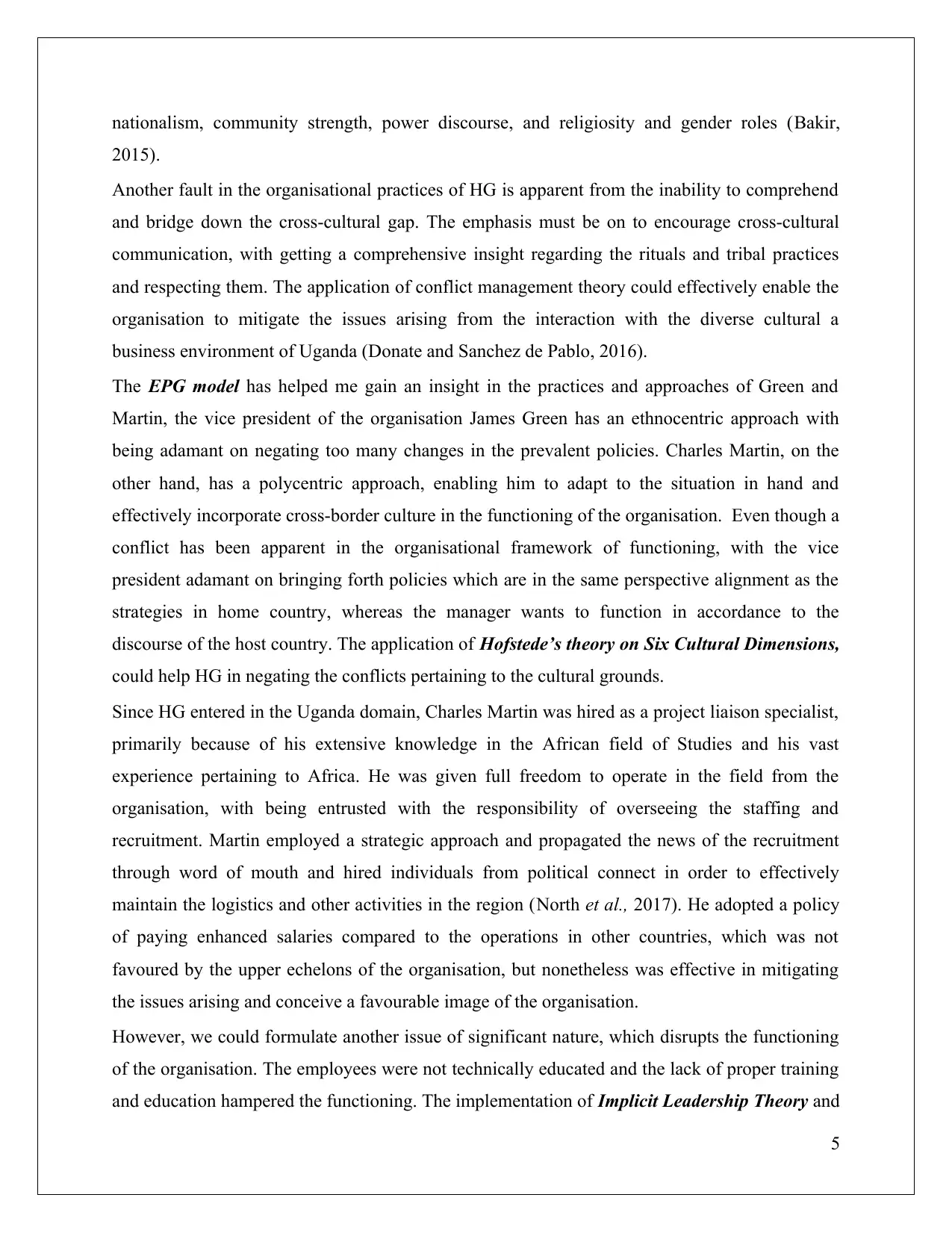
nationalism, community strength, power discourse, and religiosity and gender roles (Bakir,
2015).
Another fault in the organisational practices of HG is apparent from the inability to comprehend
and bridge down the cross-cultural gap. The emphasis must be on to encourage cross-cultural
communication, with getting a comprehensive insight regarding the rituals and tribal practices
and respecting them. The application of conflict management theory could effectively enable the
organisation to mitigate the issues arising from the interaction with the diverse cultural a
business environment of Uganda (Donate and Sanchez de Pablo, 2016).
The EPG model has helped me gain an insight in the practices and approaches of Green and
Martin, the vice president of the organisation James Green has an ethnocentric approach with
being adamant on negating too many changes in the prevalent policies. Charles Martin, on the
other hand, has a polycentric approach, enabling him to adapt to the situation in hand and
effectively incorporate cross-border culture in the functioning of the organisation. Even though a
conflict has been apparent in the organisational framework of functioning, with the vice
president adamant on bringing forth policies which are in the same perspective alignment as the
strategies in home country, whereas the manager wants to function in accordance to the
discourse of the host country. The application of Hofstede’s theory on Six Cultural Dimensions,
could help HG in negating the conflicts pertaining to the cultural grounds.
Since HG entered in the Uganda domain, Charles Martin was hired as a project liaison specialist,
primarily because of his extensive knowledge in the African field of Studies and his vast
experience pertaining to Africa. He was given full freedom to operate in the field from the
organisation, with being entrusted with the responsibility of overseeing the staffing and
recruitment. Martin employed a strategic approach and propagated the news of the recruitment
through word of mouth and hired individuals from political connect in order to effectively
maintain the logistics and other activities in the region (North et al., 2017). He adopted a policy
of paying enhanced salaries compared to the operations in other countries, which was not
favoured by the upper echelons of the organisation, but nonetheless was effective in mitigating
the issues arising and conceive a favourable image of the organisation.
However, we could formulate another issue of significant nature, which disrupts the functioning
of the organisation. The employees were not technically educated and the lack of proper training
and education hampered the functioning. The implementation of Implicit Leadership Theory and
5
2015).
Another fault in the organisational practices of HG is apparent from the inability to comprehend
and bridge down the cross-cultural gap. The emphasis must be on to encourage cross-cultural
communication, with getting a comprehensive insight regarding the rituals and tribal practices
and respecting them. The application of conflict management theory could effectively enable the
organisation to mitigate the issues arising from the interaction with the diverse cultural a
business environment of Uganda (Donate and Sanchez de Pablo, 2016).
The EPG model has helped me gain an insight in the practices and approaches of Green and
Martin, the vice president of the organisation James Green has an ethnocentric approach with
being adamant on negating too many changes in the prevalent policies. Charles Martin, on the
other hand, has a polycentric approach, enabling him to adapt to the situation in hand and
effectively incorporate cross-border culture in the functioning of the organisation. Even though a
conflict has been apparent in the organisational framework of functioning, with the vice
president adamant on bringing forth policies which are in the same perspective alignment as the
strategies in home country, whereas the manager wants to function in accordance to the
discourse of the host country. The application of Hofstede’s theory on Six Cultural Dimensions,
could help HG in negating the conflicts pertaining to the cultural grounds.
Since HG entered in the Uganda domain, Charles Martin was hired as a project liaison specialist,
primarily because of his extensive knowledge in the African field of Studies and his vast
experience pertaining to Africa. He was given full freedom to operate in the field from the
organisation, with being entrusted with the responsibility of overseeing the staffing and
recruitment. Martin employed a strategic approach and propagated the news of the recruitment
through word of mouth and hired individuals from political connect in order to effectively
maintain the logistics and other activities in the region (North et al., 2017). He adopted a policy
of paying enhanced salaries compared to the operations in other countries, which was not
favoured by the upper echelons of the organisation, but nonetheless was effective in mitigating
the issues arising and conceive a favourable image of the organisation.
However, we could formulate another issue of significant nature, which disrupts the functioning
of the organisation. The employees were not technically educated and the lack of proper training
and education hampered the functioning. The implementation of Implicit Leadership Theory and
5
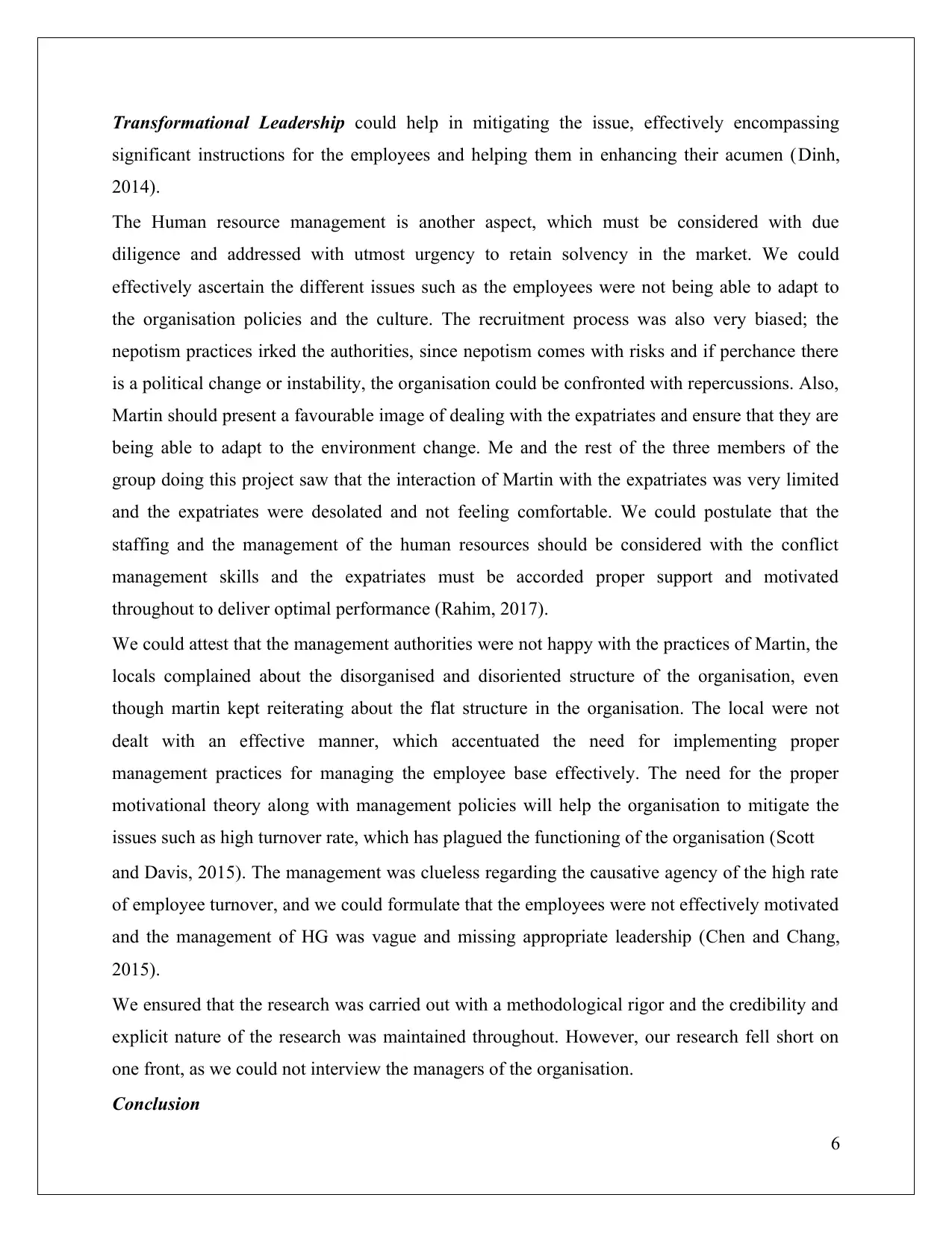
Transformational Leadership could help in mitigating the issue, effectively encompassing
significant instructions for the employees and helping them in enhancing their acumen (Dinh,
2014).
The Human resource management is another aspect, which must be considered with due
diligence and addressed with utmost urgency to retain solvency in the market. We could
effectively ascertain the different issues such as the employees were not being able to adapt to
the organisation policies and the culture. The recruitment process was also very biased; the
nepotism practices irked the authorities, since nepotism comes with risks and if perchance there
is a political change or instability, the organisation could be confronted with repercussions. Also,
Martin should present a favourable image of dealing with the expatriates and ensure that they are
being able to adapt to the environment change. Me and the rest of the three members of the
group doing this project saw that the interaction of Martin with the expatriates was very limited
and the expatriates were desolated and not feeling comfortable. We could postulate that the
staffing and the management of the human resources should be considered with the conflict
management skills and the expatriates must be accorded proper support and motivated
throughout to deliver optimal performance (Rahim, 2017).
We could attest that the management authorities were not happy with the practices of Martin, the
locals complained about the disorganised and disoriented structure of the organisation, even
though martin kept reiterating about the flat structure in the organisation. The local were not
dealt with an effective manner, which accentuated the need for implementing proper
management practices for managing the employee base effectively. The need for the proper
motivational theory along with management policies will help the organisation to mitigate the
issues such as high turnover rate, which has plagued the functioning of the organisation (Scott
and Davis, 2015). The management was clueless regarding the causative agency of the high rate
of employee turnover, and we could formulate that the employees were not effectively motivated
and the management of HG was vague and missing appropriate leadership (Chen and Chang,
2015).
We ensured that the research was carried out with a methodological rigor and the credibility and
explicit nature of the research was maintained throughout. However, our research fell short on
one front, as we could not interview the managers of the organisation.
Conclusion
6
significant instructions for the employees and helping them in enhancing their acumen (Dinh,
2014).
The Human resource management is another aspect, which must be considered with due
diligence and addressed with utmost urgency to retain solvency in the market. We could
effectively ascertain the different issues such as the employees were not being able to adapt to
the organisation policies and the culture. The recruitment process was also very biased; the
nepotism practices irked the authorities, since nepotism comes with risks and if perchance there
is a political change or instability, the organisation could be confronted with repercussions. Also,
Martin should present a favourable image of dealing with the expatriates and ensure that they are
being able to adapt to the environment change. Me and the rest of the three members of the
group doing this project saw that the interaction of Martin with the expatriates was very limited
and the expatriates were desolated and not feeling comfortable. We could postulate that the
staffing and the management of the human resources should be considered with the conflict
management skills and the expatriates must be accorded proper support and motivated
throughout to deliver optimal performance (Rahim, 2017).
We could attest that the management authorities were not happy with the practices of Martin, the
locals complained about the disorganised and disoriented structure of the organisation, even
though martin kept reiterating about the flat structure in the organisation. The local were not
dealt with an effective manner, which accentuated the need for implementing proper
management practices for managing the employee base effectively. The need for the proper
motivational theory along with management policies will help the organisation to mitigate the
issues such as high turnover rate, which has plagued the functioning of the organisation (Scott
and Davis, 2015). The management was clueless regarding the causative agency of the high rate
of employee turnover, and we could formulate that the employees were not effectively motivated
and the management of HG was vague and missing appropriate leadership (Chen and Chang,
2015).
We ensured that the research was carried out with a methodological rigor and the credibility and
explicit nature of the research was maintained throughout. However, our research fell short on
one front, as we could not interview the managers of the organisation.
Conclusion
6
⊘ This is a preview!⊘
Do you want full access?
Subscribe today to unlock all pages.

Trusted by 1+ million students worldwide
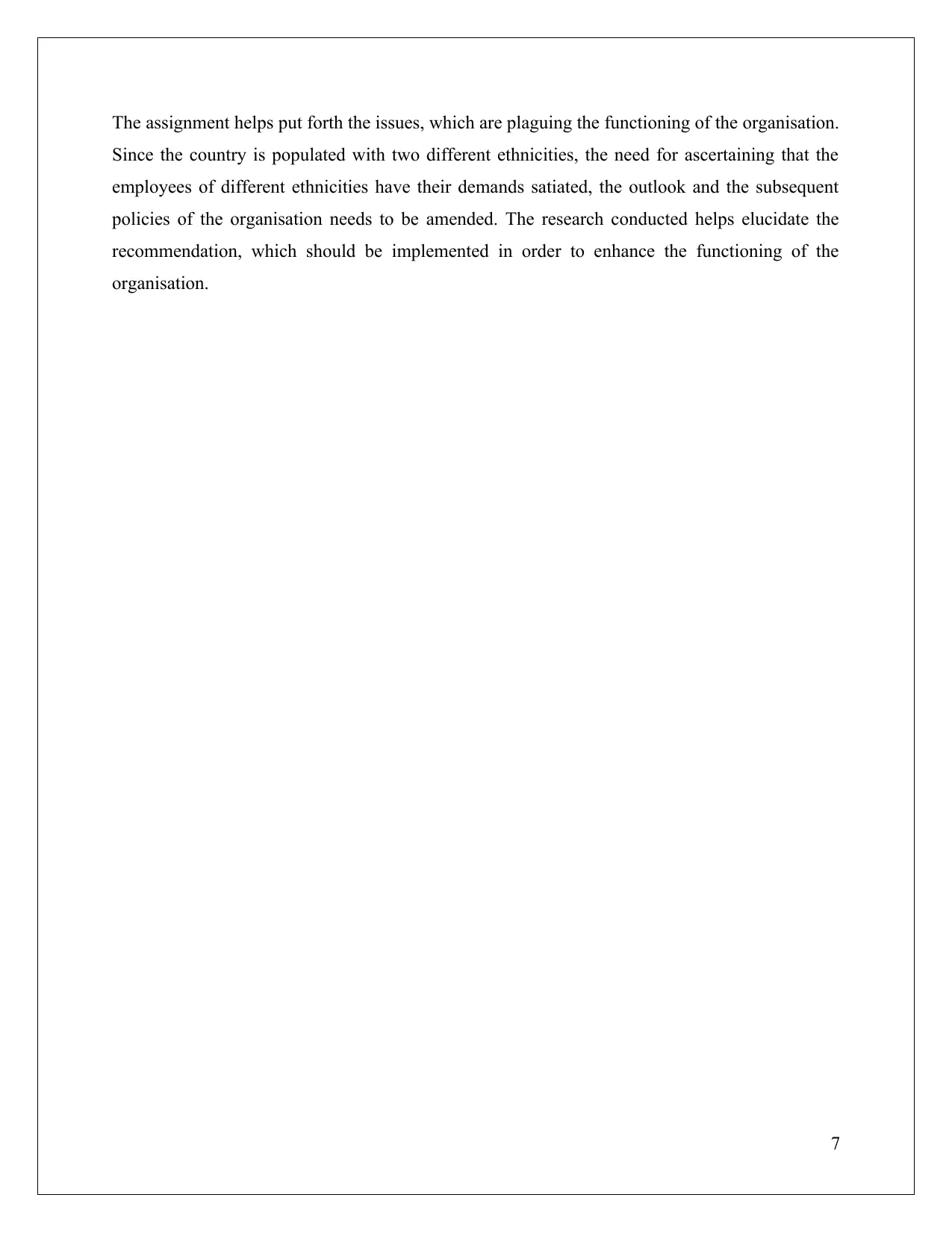
The assignment helps put forth the issues, which are plaguing the functioning of the organisation.
Since the country is populated with two different ethnicities, the need for ascertaining that the
employees of different ethnicities have their demands satiated, the outlook and the subsequent
policies of the organisation needs to be amended. The research conducted helps elucidate the
recommendation, which should be implemented in order to enhance the functioning of the
organisation.
7
Since the country is populated with two different ethnicities, the need for ascertaining that the
employees of different ethnicities have their demands satiated, the outlook and the subsequent
policies of the organisation needs to be amended. The research conducted helps elucidate the
recommendation, which should be implemented in order to enhance the functioning of the
organisation.
7
Paraphrase This Document
Need a fresh take? Get an instant paraphrase of this document with our AI Paraphraser
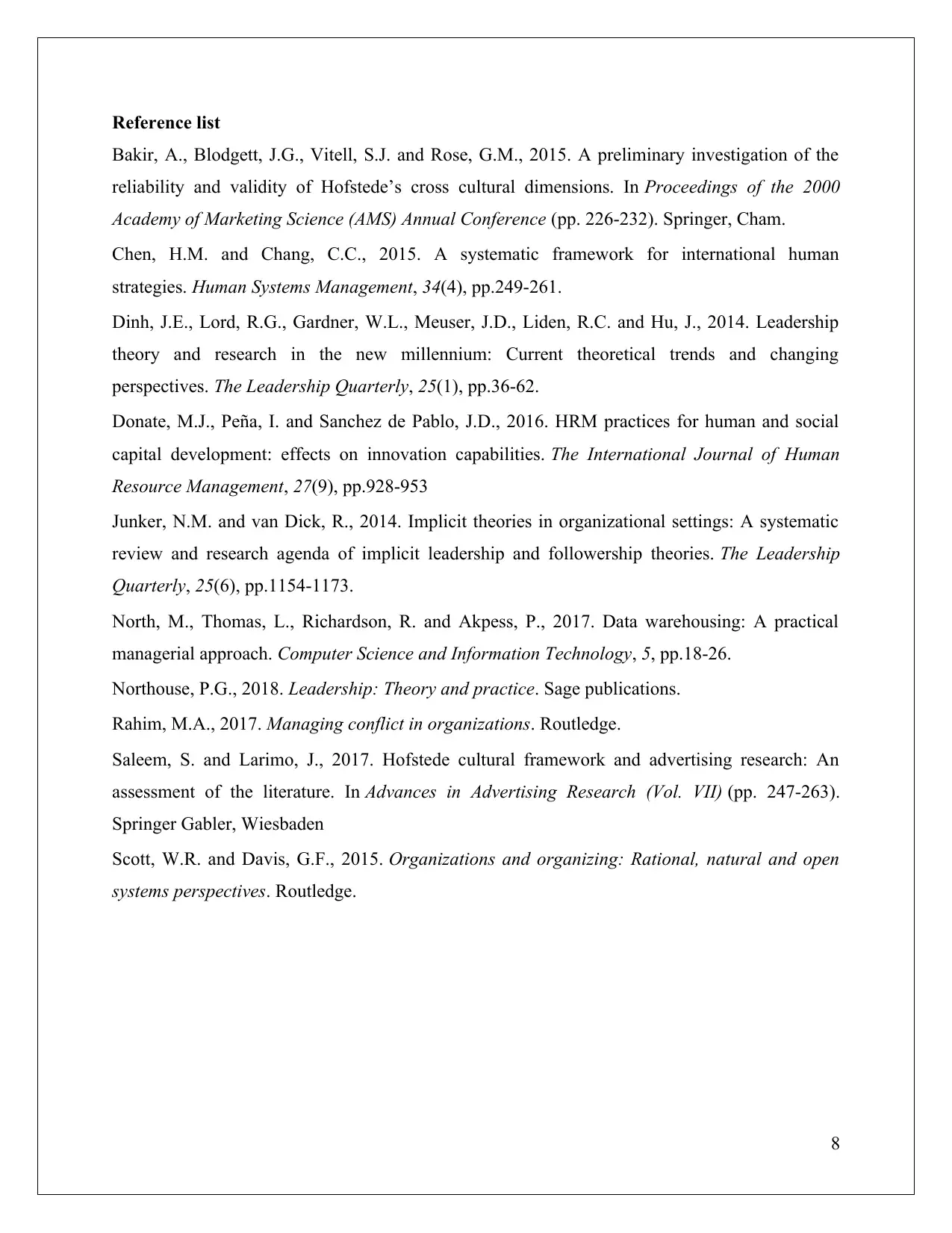
Reference list
Bakir, A., Blodgett, J.G., Vitell, S.J. and Rose, G.M., 2015. A preliminary investigation of the
reliability and validity of Hofstede’s cross cultural dimensions. In Proceedings of the 2000
Academy of Marketing Science (AMS) Annual Conference (pp. 226-232). Springer, Cham.
Chen, H.M. and Chang, C.C., 2015. A systematic framework for international human
strategies. Human Systems Management, 34(4), pp.249-261.
Dinh, J.E., Lord, R.G., Gardner, W.L., Meuser, J.D., Liden, R.C. and Hu, J., 2014. Leadership
theory and research in the new millennium: Current theoretical trends and changing
perspectives. The Leadership Quarterly, 25(1), pp.36-62.
Donate, M.J., Peña, I. and Sanchez de Pablo, J.D., 2016. HRM practices for human and social
capital development: effects on innovation capabilities. The International Journal of Human
Resource Management, 27(9), pp.928-953
Junker, N.M. and van Dick, R., 2014. Implicit theories in organizational settings: A systematic
review and research agenda of implicit leadership and followership theories. The Leadership
Quarterly, 25(6), pp.1154-1173.
North, M., Thomas, L., Richardson, R. and Akpess, P., 2017. Data warehousing: A practical
managerial approach. Computer Science and Information Technology, 5, pp.18-26.
Northouse, P.G., 2018. Leadership: Theory and practice. Sage publications.
Rahim, M.A., 2017. Managing conflict in organizations. Routledge.
Saleem, S. and Larimo, J., 2017. Hofstede cultural framework and advertising research: An
assessment of the literature. In Advances in Advertising Research (Vol. VII) (pp. 247-263).
Springer Gabler, Wiesbaden
Scott, W.R. and Davis, G.F., 2015. Organizations and organizing: Rational, natural and open
systems perspectives. Routledge.
8
Bakir, A., Blodgett, J.G., Vitell, S.J. and Rose, G.M., 2015. A preliminary investigation of the
reliability and validity of Hofstede’s cross cultural dimensions. In Proceedings of the 2000
Academy of Marketing Science (AMS) Annual Conference (pp. 226-232). Springer, Cham.
Chen, H.M. and Chang, C.C., 2015. A systematic framework for international human
strategies. Human Systems Management, 34(4), pp.249-261.
Dinh, J.E., Lord, R.G., Gardner, W.L., Meuser, J.D., Liden, R.C. and Hu, J., 2014. Leadership
theory and research in the new millennium: Current theoretical trends and changing
perspectives. The Leadership Quarterly, 25(1), pp.36-62.
Donate, M.J., Peña, I. and Sanchez de Pablo, J.D., 2016. HRM practices for human and social
capital development: effects on innovation capabilities. The International Journal of Human
Resource Management, 27(9), pp.928-953
Junker, N.M. and van Dick, R., 2014. Implicit theories in organizational settings: A systematic
review and research agenda of implicit leadership and followership theories. The Leadership
Quarterly, 25(6), pp.1154-1173.
North, M., Thomas, L., Richardson, R. and Akpess, P., 2017. Data warehousing: A practical
managerial approach. Computer Science and Information Technology, 5, pp.18-26.
Northouse, P.G., 2018. Leadership: Theory and practice. Sage publications.
Rahim, M.A., 2017. Managing conflict in organizations. Routledge.
Saleem, S. and Larimo, J., 2017. Hofstede cultural framework and advertising research: An
assessment of the literature. In Advances in Advertising Research (Vol. VII) (pp. 247-263).
Springer Gabler, Wiesbaden
Scott, W.R. and Davis, G.F., 2015. Organizations and organizing: Rational, natural and open
systems perspectives. Routledge.
8

9
⊘ This is a preview!⊘
Do you want full access?
Subscribe today to unlock all pages.

Trusted by 1+ million students worldwide
1 out of 9
Your All-in-One AI-Powered Toolkit for Academic Success.
+13062052269
info@desklib.com
Available 24*7 on WhatsApp / Email
![[object Object]](/_next/static/media/star-bottom.7253800d.svg)
Unlock your academic potential
Copyright © 2020–2026 A2Z Services. All Rights Reserved. Developed and managed by ZUCOL.


